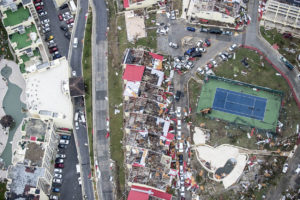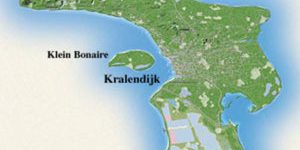Hurricanes Make The Need To Dismantle Colonial Economics In The Caribbean Increasingly Urgent
No comments yetHurricanes have always been a part of life in the Caribbean. The destruction they cause and inhabitants’ subsequent recovery have been observed throughout human history. What is alarming now, however, is the apparent increased frequency and intensity of hurricanes due to climate change.
For the Caribbean territories, the climate change challenges are even more severe than they are for most other places around the globe because they have an impact on the entire coastal and terrestrial ecosystems. The already poor state of the Caribbean marine environment restricts the ability of habitats such as seagrass meadows and coral reefs to recover from the effects of severe storms. Poor water quality and over-fishing, for example, promotes the overgrowth of algae, preventing recovery. With repeated hurricanes occurring over time periods that are insufficient for recovery to occur, this will only get worse.
Moreover, climate change can be expected to have negative effects on the tourism and hospitality industry. According to the Caribbean Planning for Adaptation to Global Climate Change Project, virtually all the Caribbean territories are highly vulnerable to climate changes and can expect to experience a “linear increases in the number of storms and hurricanes … loss of land from rising sea level … increased susceptibility of coastal infrastructure … negative impacts in the tourism sector.”
In this context, the severity of hurricanes Irma and Maria, which caused catastrophic destruction, should be a wake-up call, even though the devastation was not equally distributed across the Caribbean, and it will be far more challenging for some countries than others to recover from their tragic situations.
Caribbean policy makers need a fundamental shift in how marine environments are protected to enable long-term sustainability for the food and income they provide. Many locations in the Caribbean — for example, Puerto Rico — have ineffective marine protection rules and so destructive practices continue unchecked, meaning that when a disaster does occur, the environment is unable to recover. Besides, previous hurricanes, cyclones and typhoons across the globe have shown the severe negative effects storms can have on the marine environment. Hurricane Irma — one of the strongest on record to hit the region — recently scoured the islands leaving catastrophic damage in its wake, even in Cuba, “a country that prides itself on disaster preparedness.”
And just as the Caribbean began to piece together the devastating and potentially long-term impacts of Irma, Hurricane Maria has now left another path of destruction. Puerto Rico, the British dependency of the Turks and Caicos, and many other Caribbean islands have suffered what have been described as “apocalyptic conditions.” More than 30 cruise ports were damaged by these two hurricanes.
Some of the most severely affected areas of the recent hurricanes in the Caribbean — Florida, Turks and Caicos, Cuba, the British Virgin Islands and Puerto Rico — all house extensive seagrass meadows. These shallow water marine habitats support valuable lobster fisheries, as well as shrimp, conch and finfish fisheries. Seagrass also stabilizes sediments and protects the white sand beaches that attract so many tourists to the region. The devastation of coastal environments, particularly seagrass meadows, can also result in long-term losses of the benefits that humans receive from them, such as fisheries support or coastal protection. Damage to these ecosystem services consequently impacts human well-being, because people can no longer rely on them for their livelihood and food supply.
Breaking Away From a Colonial Past
The Caribbean region is a distinctive socioeconomic order, determined by experiences of a historical formation rooted in colonialism and the plantation system and all the consequences manifested in social stratification, cultural contradictions and endemic economic limitations — as Caribbean nations developed under the tutelage of different European empires, and more recently under North American dominance. The persistence of Caribbean plantation system “variables” is a fact, and the economies of the region eventually evolved typically into monocrop production, which is mostly foreign-owned and export-oriented. Later, since the 1960s, emphasis on crops such as sugar, coffee and bananas was replaced by an excessive emphasis on tourism, which has been heralded as the road to modernity and prosperity.
The world economy is expanding rapidly despite chronic economic crises. Yet large segments of Caribbean population live in poverty. Inequality in the region has reached dramatic levels in the last few decades and continues to grow — and this is not by chance. Small elites are making themselves richer and richer, acquiring ever-increasing levels of power. Even though Caribbean countries are signatories to a wide variety of conventions and international agreements such as the Cotonou Agreement in 2000 and the EU-Cariforum Economic Partnership Agreement in 2008, economies in the region have been grappling with the challenges of blocked development and neoliberal globalization, along with the tyranny of financialization. Furthermore, the nature of the current financial integration of Caribbean countries has created new forms of external vulnerability.
Evidently, globalization has already impacted the economies and societies of the Caribbean: exacerbation of economic instability and vulnerability, rising current account and fiscal deficits alongside high debt obligations, a slowdown in productivity growth, limited adjustment in traditional sectors, high unemployment and underemployment, the growing distance between rich and poor, reduction and deterioration of public services and the quality of infrastructure, increasing social problems, marginalization and social exclusion, unfair competition arrangements which put Caribbean nations in a situation of ever-increasing inferiority, and degradation of the environment and natural resources.
Tourism is one of the most important economic activities in the Caribbean, contributing a third to half of GDP in most countries. The fundamental environmental resources used in Caribbean tourism are basically the “sun, sand and sea.” Whether tourism is based on stopover visitors or cruise ships, Caribbean countries rely on their natural environment as the main lure to visitors, as well as an important source of welfare for their own citizens. However, the resources upon which the tourism industry is based are very fragile. Except for the sun, each of these resources — as well as supporting resources such as potable water — are subject to damage and depletion. Threats to environmental resources used by the tourism sector can arise both within and outside the sector.
Establishing the relative impact of different environmental threats is important but often difficult. For example, in St Lucia, tourists generate twice the amount of waste per day that residents generate. They contribute, however, only about 5 percent of total waste, because of the short length of their stay. The magnitude of the threats posed by environmental damage to tourism ranges from minor inconveniences to severe threats, so large portions of local resources become unusable. Similarly, disposal of waste and untreated wastewater and sewage into the sea in Negril, Jamaica, severely curtailed diving, leading to a substantial reduction in visitors. This vexing problem still exists. As tourists become both more environmentally aware and better informed of possible environmental problems, it is likely that the costs of inaction will rise, with a possible decrease in tourism to the region.
Taking these important issues into consideration, it becomes crucial that the Caribbean transforms from a region enduring colonial woes to one in which each society becomes self-reliant, economically viable, eco-friendly, technologically responsive, politically stable and culturally secure. Protecting the tourism sector, in particular, and the economic benefits it brings, requires ensuring that the environmental resources the sector relies upon are managed sustainably. But the sustainable development of tourism in the Caribbean territories — an industry which does indeed generate incomes, creates jobs and alleviates poverty — implies the need for climate change adaptations and disaster preparedness by the respective governments and communities in the region.
Although local actions against climate change are difficult to achieve, it is possible to focus on small-scale immediate actions, such as implementation of marine protected areas to limit direct damage to coastal resources. Coordinated actions on this scale will ultimately help enhance the resilience of the Caribbean Sea, and make sure that the environment can better recover from any future extreme events.
On the broader political front, sociopolitical endeavors should center around labor-led struggles for development, which can empower even poor Caribbean societies to overcome many of the obstacles that halt social progress. To this end, collective actions by progressive intellectuals, laboring classes and social movements can help improve overall conditions, as well as social and business infrastructure, while generating new forms of human development and local skill banks.
Previously published: http://www.truth-out.org/the-need-to-dismantle-colonial-economics-in-the-caribbean-increasingly-urgent
You May Also Like
Comments
Leave a Reply









